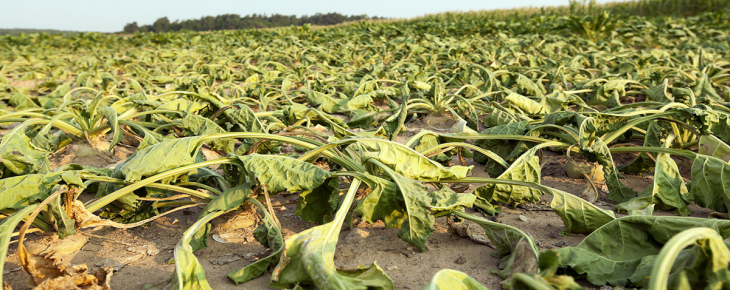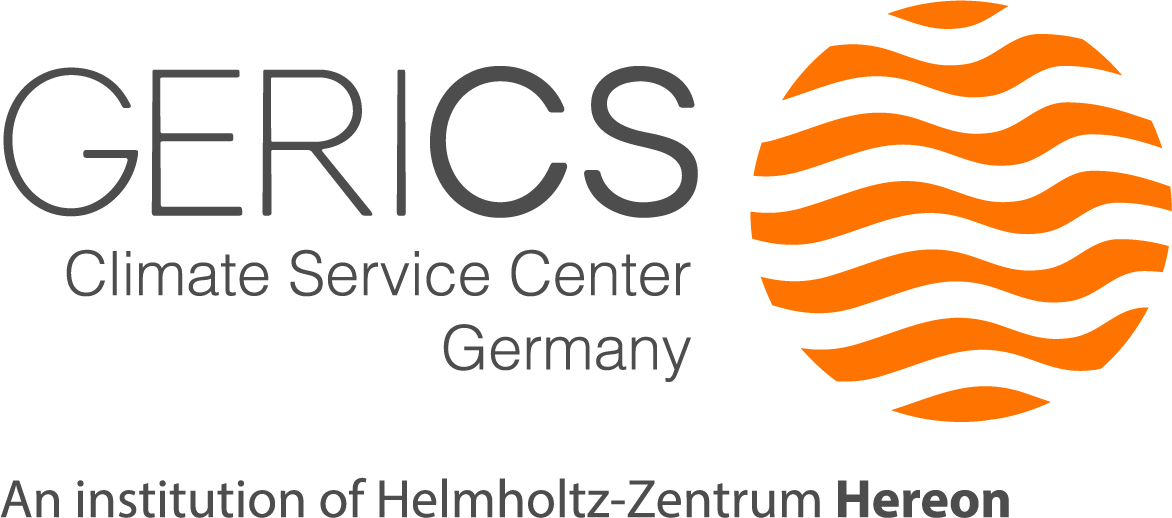Are we threatened by a new summer of drought in 2020?
Scientific work on droughts under climate change
Scientists of the Climate Service Center Germany GERICS have compiled material on the topic "Drought and Climate Change" on this page.

Photo: Fotolia/rsooll
Soil moisture in Germany has reached in April 2020 alarmingly low levels for several reasons: since mid of March, there has been very low rainfall. In addition, the earlier start of the vegetation period, high radiative input and partly strong wind led to high evaporation rates. Forest fire alert level raised across Germany.
Farmers, business representatives and scientists are worried about the lack of spring rain. With continuing water scarcity, the danger of drought is growing in Germany. The last two years have also been exceptionally dry. If there is no rainfall in the coming weeks, agriculture is threatened with low yields. A similar situation is happening in the vegetated and forested areas too, in which not only the lack of rainfall is a problem but also the intense summer heat and pest infestation in the last three years.
This is a collection of drought-related activities in GERICS, as well as interesting links and related documents.
Drought-related activities
GERICS is partner in the EU project NAIAD (NAture Insurance value: Assessment and Demonstration). NAIAD aims to operationalize the insurance value of ecosystems to reduce the human and economic cost of risks associated with water (floods and drought). One case study in Spain, in which we are involved, is related to droughts in agricultural areas.
Homepage NAIAD
GERICS is partner in the EU project INNOVA (Innovation in Climate Services Provision). One important project goal is the co-development of innovative solutions to transform climate risks into opportunities actively engaging a variety of stakeholders. INNOVA is showing a) for Guadeloupe how to develop climate services for the agricultural sector to overcome diverse extreme events, including water scarcity and droughts; b) for Valencia how to develop climate services for the urban water sector to adapt to droughts and water scarcity impacting the quality of water.
Homepage INNOVA
GERICS is partner in the EU project “Climateurope - Linking science and society”. Here we develop and organize a series of Climateurope festivals. The conference format with festival character contributes in a special way to stimulating the dialogue between climate science, climate service providers and users. The first day of the "Climateurope Festival 2017" in Valencia, Spain, which took place from 5-7 April 2017, was dedicated entirely to the topic "From climate information to climate services in Water Sector", which also included the topic of drought.
Homepage Climateurope 2017
GERICS is partner in the BMBF-funded project HAPPI-DE (Half a degree Additional warming, Prognosis and Projected Impacts). Within HAPPI-DE we have developed some regional drought indices for different regions in Europe below 1.5 and 2 degrees global warming. See:
Sieck, K., Nam, C., Bouwer, L. M., Rechid, D., and Jacob, D.: Weather extremes over Europe under 1.5 °C and 2.0 °C global warming from HAPPI regional climate ensemble simulations, Earth Syst. Dynam. Discuss., DOI: org/10.5194/esd-2020-4, in review, 2020.
GERICS is partner in the project ADAPTER (ADAPT tERrestrial systems), which is . funded by the Helmholtz Association. The overarching goal of ADAPTER is to create a broader information base for agriculture. The aim is to make better informed choices towards more sustainable, weather and climate resilient agriculture. In this project, the issue of drought plays a major role.
The project IMLAND (Integrative modeling lab on agricultural adaptation in North Germany), an ongoing project in the frame of the Helmholtz Institute for Climate Service Science (HICSS), mainly deals with adaptation strategies to reduce the effects of droughts on agriculture in in the northeast of Lower Saxony.
Project IMLAND @ HICSS
The LANDMATE project (Modelling human LAND surface Modifications and its feedbacks on local and regional cliMATE), also a HICSS project, carries out research on direct biophysical effects of human land surface modifications on local and regional climate. Detailed studies on the effects of irrigation practices – an adaptation measure to cope with droughts - as well as on the impact of land cover changes under drought conditions are conducted.
Project LANDMATE @ HICSS
GERICS publications belonging to the field of drought (or publications with participation of GERICS)
- Langendijk, G.S.; Rechid, D.; Jacob, D.: Urban Areas and Urban–Rural Contrasts under Climate Change: What Does the EURO-CORDEX Ensemble Tell Us?—Investigating Near Surface Humidity in Berlin and Its Surroundings. Atmosphere 2019, 10, 730. DOI: 10.3390/atmos10120730
- Spinoni, J., Barbosa, P., Bucchignani, E., Cassano, J., Cavazos, T., Christensen, J.H., Christensen, O.B., Coppola, E., Evans, J., Geyer, B., Giorgi, F., Hadjinicolaou, P., Jacob, D., Katzfey, J., Koenigk, T., Laprise, R., Lennard, C.J., Levent Kurnaz, M., Li, D., Llopart, M., McCormick, N., Naumann, G., Nikulin, G., Ozturk, T., Panitz, H.-J., Porfirio da Rocha, R., Rockel, B., Solman, S.A., Syktus, J., Tangang, F., Teichmann, C., Vautard, R., Vogt, J.V., Winger, K., Zittis, G., Dosio, A. (2020): Future Global Meteorological Drought Hot Spots: A Study Based on CORDEX Data. Journal of Climate, 2020, 33, 3635-3661, DOI: org/10.1175/JCLI-D-19-0084.1
- Teichmann C, Bülow K, Otto J, Pfeifer S, Rechid D, Sieck K, Jacob D. 2018. Avoiding Extremes - Benefits of Staying below+ 1.5° C Compared to+ 2.0° C and+ 3.0° C Global Warming. Atmosphere 9 (4), 115. DOI: 10.3390/atmos9040115
- Sieck, K., Nam, C., Bouwer, L. M., Rechid, D., and Jacob, D.: Weather extremes over Europe under 1.5 °C and 2.0 °C global warming from HAPPI regional climate ensemble simulations, Earth Syst. Dynam. Discuss., DOI: org/10.5194/esd-2020-4, in review, 2020.
- Weber, T., Bowyer, P., Rechid, D., Pfeifer, S., Raffaele F, Remedio, A.R., Teichmann, C., and Jacob, D. (2020): Analysis of Compound Climate Extremes and Exposed Population. submitted to Earth Future, in review.
Publications based on research made within EU project IMPREX
- Kovalevsky, D.V., Máñez Costa, M., (2020): Dynamics of water-constrained economies affected by climate change: nonlinear and stochastic effects. In: The Many Facets of Complexity Science: In Memory of Valentin Afraimovich (1945-2018), Ed. Volchenkov, D., Higher Education Press (China) / Springer [in press].
- Kovalevsky, D.V., Máñez Costa, M. (2019): Modelling the demand for weather index-based insurance products in regions prone to agricultural droughts. 59th ERSA congress “Cities, regions and digital transformations: Opportunities, risks and challenges”, 27-30 August 2019, Lyon, France
- Máñez Costa, M., Kovalevsky, D. (2018): Participatory system dynamics modelling for adaptation to extreme hydrological events under conditions of climate change. The 36th International Conference of the System Dynamics Society (ISDC 2018), 06-10 August 2018, Reykjavík, Iceland.
- Kovalevsky, D.V., Kriegsmann, A., Williams, D., Máñez Costa, M. (2018): Integrated Risk Maps. EU H2020 IMPREX Deliverable D13.2.
- Máñez Costa, M., Osorio, J., Kovalevsky, D.V. (2017): Generic Integrative Modeling Approach Guideline. EU H2020 IMPREX Deliverable D13.1.
Contributions to the web platform Klimanavigator, coordinated by GERICS
Interesting publications of other authors
- Kornhuber, K., Osprey, S., Coumou, D., Petri, S., Pethoukhov, V., Rahmstorf, S., Grey, L. (2019): Extreme weather events in early summer 2018 connected by a recurrent hemispheric wave-7 pattern. Environ. Res. Lett.14 054002
- Pfleiderer, P., Schleussner, C.-F., Kornhuber, K., Coumou, D. (2019): Summer weather becomes more persistent in a 2 °C world. Nature Climate Change, 9, 666–671.
Other interesting links
- „Dürremonitor Deutschland“ des UFZ (Helmholtz-Zentrum für Umweltforschung)
- Bericht zur Risikoanalyse im Bevölkerungsschutz 2018. Deutscher Bundestag, Unterrichtung durch die Bundesregierung, Drucksache 19/9521, 2019 (vor allem Risikoanalyse „Dürre“)
- GERICS Kommentar zum Statement des Deutschen Komitee für Katastrophenvorsorge e.V. (DKKV) "Die Dürre 2018 und ihre Folgen“
Contact
Scientist
Climate Service Center Germany GERICS
Helmholtz-Zentrum Geesthacht
Phone: +49 (0) 40 226 338 452
Fax: +49 (0) 40 226 338 163
E-mail contactWebsite
